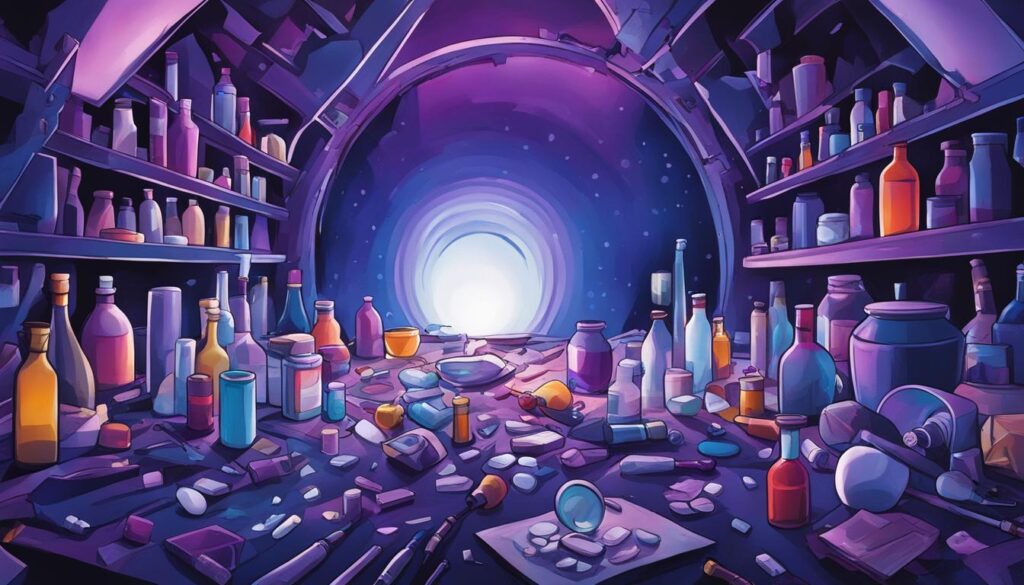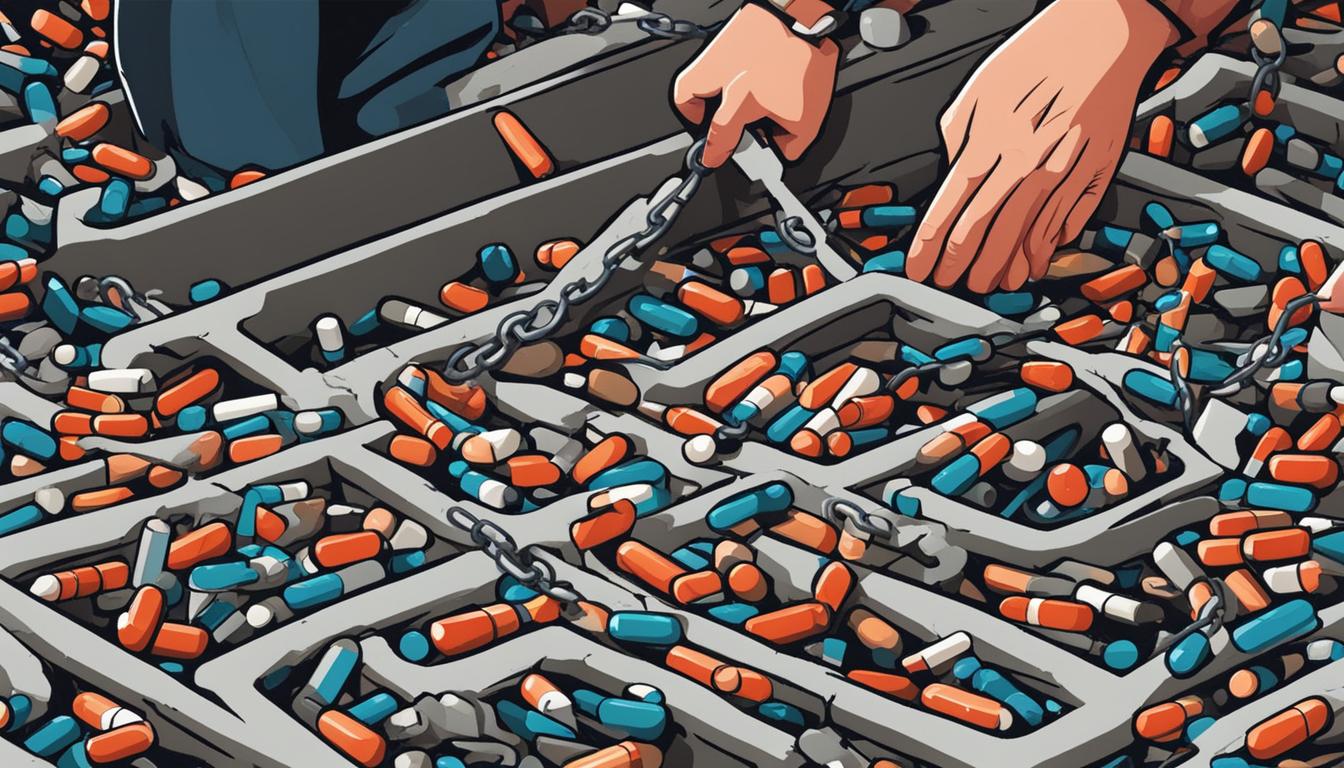Drug addiction is a complex and devastating problem that affects millions of people worldwide. Lonny Shavelson’s book ‘Hooked: Five Addicts Challenge Our Misguided Drug Rehab System’ provides a poignant and insightful account of addiction and the flaws in our current drug rehabilitation system.
The book offers a gripping exploration of the personal journeys of five addicts and the challenges they faced in their quest for recovery. Shavelson critically examines the existing rehabilitation programs, highlighting their shortcomings and identifying areas for improvement. Moreover, the book explores alternative approaches to drug rehabilitation and considers the societal factors that impact addiction and rehabilitation.
Key Takeaways
- The book ‘Hooked: Five Addicts Challenge Our Misguided Drug Rehab System’ provides a compelling account of addiction and the flaws in our current rehabilitation system.
- The book delves into the personal journeys of five addicts, highlighting the challenges they faced and the impact of the flawed drug rehab system.
- Shavelson critically examines the current rehabilitation programs, identifying their shortcomings and areas for improvement.
- The book explores alternative approaches to drug rehabilitation, offering potential solutions to the current shortcomings in traditional rehab programs.
- Societal factors play a significant role in addiction and impact rehabilitation. Understanding and addressing these factors is crucial for effective treatment.
Introduction to ‘Hooked’
‘Hooked: Five Addicts Challenge Our Misguided Drug Rehab System’ by Lonny Shavelson is a thought-provoking and emotionally charged book that explores the realities of addiction and the challenges faced by individuals seeking rehabilitation. Shavelson provides readers with a unique perspective on the subject by presenting the experiences of five addicts struggling with different forms of addiction and their journey through drug rehab programs.
The book’s purpose is to challenge the current drug rehab system by highlighting its shortcomings, ultimately urging readers to rethink our approach to substance abuse treatment. By presenting the personal stories of five individuals, Shavelson humanizes addiction and provides a more nuanced understanding of the complexities of drug dependency.
In this section, we will introduce readers to the book and provide an overview of its key themes. We will examine the author’s purpose in writing the book and how it relates to the broader conversation about addiction and drug rehab. By the end of this section, readers will have a better understanding of the book’s focus and what they can expect from the following sections.
Understanding Addiction
Addiction is a complex condition that affects brain function and behavior. It is characterized by a compulsive and uncontrollable urge to use drugs, despite adverse consequences. Substance abuse, also known as drug abuse, is the patterned use of a drug to achieve an altered state of consciousness. Substance abuse can lead to addiction, which exposes individuals to a wide range of physical and psychological consequences.
The different types of substance abuse include:
- Alcohol
- Tobacco
- Prescription drugs
- Marijuana
- Cocaine
- Heroin
It is important to understand the factors that contribute to dependency. These include genetic and environmental factors, as well as mental health conditions such as anxiety and depression. Trauma and unresolved emotional issues can also contribute to addiction and substance abuse.
Risk Factors for Addiction
| Factor | Description |
|---|---|
| Genetics | Family history of addiction |
| Environment | Lack of parental supervision, peer pressure, exposure to drugs, stressful life events |
| Mental Health Conditions | Depression, anxiety, ADHD, bipolar disorder |
| Trauma | Childhood abuse, neglect, sexual trauma |
Understanding addiction and its risk factors is crucial in developing effective rehabilitation programs to help individuals struggling with substance abuse and addiction.
The Current Drug Rehabilitation System
The current drug rehabilitation system offers various programs and treatments to individuals struggling with addiction. These programs range from inpatient and outpatient programs to support groups and counseling services. Inpatient programs, also known as residential treatment, provide a highly structured environment for individuals to focus solely on their recovery. Outpatient programs, on the other hand, allow individuals to receive treatment while still maintaining their daily responsibilities.
While these programs have been successful for some individuals, they still have some shortcomings. One major challenge is the accessibility and affordability of these programs. Many individuals may not be able to afford or access the treatment they need, which can hinder their recovery process.

Another challenge is the effectiveness of these programs. According to a report by the National Institute on Drug Abuse, only about half of individuals who attend a rehabilitation program stay in treatment long enough to see the full benefits.
Additionally, certain factors such as stigmatization and lack of community support can also impact an individual’s rehabilitation process. To truly address these obstacles and provide effective treatment, a more holistic approach to drug rehabilitation is necessary. Such an approach should take into account the individual’s mental, emotional, and social well-being, and should prioritize accessibility and affordability.
Five Addicts’ Stories
In ‘Hooked: Five Addicts Challenge Our Misguided Drug Rehab System,’ Lonny Shavelson presents the real-life experiences of five individuals struggling with addiction. Each individual’s story underscores the debilitating impact of addiction not only on the individual but also on their family and community.
One of the book’s subjects, Stella, started using drugs at a young age to cope with her feelings of inadequacy and loneliness. Her addiction spiraled out of control, leading to multiple relapses as she struggled to find effective treatment.
Another subject of the book, Joey, started using drugs as a teenager to fit in with his peers. However, his addiction quickly became unmanageable, and he became homeless as a result. Despite multiple attempts at rehabilitation, Joey continued to struggle with addiction.
The stories of Robert, Flo, and Janice also highlight the challenges faced by those struggling with addiction and the inadequacies of the current drug rehab system in providing effective treatment.
Through these addict stories, Shavelson highlights the urgent need for a more effective and compassionate approach to drug rehabilitation. The book challenges readers to think critically about the current system and to support efforts to improve it.
Critique of the Drug Rehab System
Lonny Shavelson’s book, ‘Hooked: Five Addicts Challenge Our Misguided Drug Rehab System,’ offers candid insights into the shortcomings and flaws of the current drug rehab system. The author highlights several critical issues that prevent effective treatment of individuals struggling with addiction.
Shavelson critiques the ‘one size fits all’ approach to rehab and argues that this cookie-cutter approach fails to consider the unique needs of each patient. According to the author, the system lacks personalization and fails to recognize the root cause of addiction that varies widely between individuals. He points out that addiction is a complex disease that requires a tailored approach to be effective in treating each patient’s unique needs.
Another drawback of the current drug rehab system, as seen in the book, is the over-reliance on medication-based treatments. Shavelson highlights how the prolonged use of medication for addiction treatment can lead to dependence on the medication itself, defeating the purpose of rehabilitation and causing more harm than good in the long term.
Moreover, the author stresses the importance of community and aftercare support in addiction treatment, which is severely lacking in the current system. Shavelson points out that support from peers and a stable environment is crucial to prevent relapse, yet the current rehab system fails to provide sufficient resources in this regard.
Overall, the book highlights the urgent need for an overhaul of the current drug rehab system. Personalized and holistic approaches to rehab, inclusion of community support, and aftercare programs are essential to ensure effective treatment of addiction. By identifying the flaws and shortcomings of the current system, the book prompts society to address the fundamental issues and create a better system that truly serves individuals struggling with addiction.
Alternatives to Traditional Drug Rehabilitation
While traditional drug rehabilitation methods have proven to be effective for many individuals, they may not be suitable for everyone. Fortunately, there are alternative approaches to drug rehabilitation that offer potential solutions to the current shortcomings in traditional rehab programs.
Alternative Treatments
Alternative treatments for addiction may include non-traditional therapies such as acupuncture, meditation, or yoga. These treatments aim to treat addiction holistically, addressing the physical, mental, and emotional effects of substance abuse.
Innovative Approaches
Several innovative approaches have been developed to address the flaws in traditional drug rehabilitation. One such approach is the use of technology, such as virtual reality therapy, which can create immersive environments that simulate real-life situations for individuals to practice coping mechanisms in a controlled setting.
Holistic Therapy
Holistic therapy is another alternative to traditional drug rehabilitation. Holistic therapies aim to treat the individual as a whole rather than solely addressing their addiction. These therapies may include practices such as massage therapy, art therapy, or wilderness therapy.

Alternative approaches to drug rehabilitation offer hope for those who have been unsuccessful with traditional rehab programs or those seeking a more well-rounded approach to treatment. When selecting an alternative approach, it is important to consult with a healthcare professional to determine the best course of action for each individual.
Societal Factors Influencing Addiction and Rehabilitation
Social influences and societal factors play a significant role in addiction and the recovery process. Factors such as poverty, unemployment, and lack of access to healthcare can increase the risk of substance abuse. On the other hand, community support systems can serve as a critical factor in an individual’s rehabilitation journey.
Studies have shown that individuals with strong support systems and connections to their communities are more likely to achieve long-term recovery from addiction. Community-based recovery programs, such as Alcoholics Anonymous, provide individuals with a sense of belonging and the ability to connect with others who have gone through similar experiences.
Socioeconomic factors can also impact an individual’s access to quality treatment. Individuals from low-income backgrounds may not have access to the resources needed to attend rehab programs or receive proper medical care. This can further perpetuate the cycle of addiction, as the individual may not receive the necessary treatment to overcome their substance abuse issues.
| Societal Factors | Impact on Addiction and Rehabilitation |
|---|---|
| Community support systems | Positively impacts an individual’s rehabilitation journey |
| Socioeconomic status | Can limit access to quality treatment and perpetuate addiction |
| Mental health stigma | Can prevent individuals from seeking treatment due to fear of discrimination |
It is essential to recognize and address the societal factors that contribute to addiction and impact rehabilitation. By providing individuals with the necessary resources and community support, we can help prevent substance abuse and promote long-term recovery.
Revisiting the Five Addicts’ Progress
Throughout ‘Hooked: Five Addicts Challenge Our Misguided Drug Rehab System’ Lonny Shavelson expertly depicts the five addicts’ journeys toward recovery. As we revisit their progress today, we are given a window into the reality of the rehabilitation process. The accounts in the book uncover the personal growth and progress of the five individuals over time.
Each person faced unique challenges throughout their recovery journey, overcoming significant obstacles in varying degrees. Katie, for instance, found the support of her family to be an invaluable asset during her rehabilitation. Conversely, Marc’s attempts at recovery were hindered by a lack of support and understanding in his community. These stories illustrate how, for better or worse, outside influences impact the recovery journey and ultimately the personal growth and development of the addict.
Despite the difficulties, the book highlights the possibility of recovery and offers hope to those struggling with addiction. It illustrates how rehabilitation is a journey that requires patience, perseverance, and support to succeed.
Future Prospects for Drug Rehabilitation
The future of rehab is filled with promise, as advancements in technology and changing approaches to addiction treatment offer hope for those struggling with substance abuse. One major area of development is in the use of virtual reality to treat addiction, a technology that has shown great promise in clinical trials.
Another area of focus for the future of rehab is a more personalized approach to treatment. Rather than a one-size-fits-all approach, rehab programs are beginning to adopt methods that are tailored to each individual’s needs and circumstances.
Emerging Technologies and Approaches
As mentioned, virtual reality has shown great potential in the treatment of addiction. By immersing individuals in simulated environments, clinicians are able to help them confront the underlying causes of their addiction in a safe and controlled setting.
Other emerging technologies include neurofeedback, which helps individuals learn to consciously regulate their brainwave activity, and teletherapy, which provides remote access to mental health professionals.
Alternative Therapies and Holistic Approaches
Many rehab programs are also embracing alternative therapies and holistic approaches to addiction treatment. These treatments focus on healing the whole person, rather than simply treating the symptoms of addiction.
Examples of alternative and holistic therapies include acupuncture, meditation, yoga, and nutrition counseling. These therapies aim to improve emotional and physical health, reduce stress, and promote overall wellness.
Importance of Continuous Improvement
As the field of addiction treatment continues to evolve, it is more important than ever to continuously reassess and improve existing approaches. By embracing new technologies and therapies, and focusing on personalized treatment that meets the unique needs of each individual, we can create a brighter future for those struggling with addiction.
Conclusion
Lonny Shavelson’s book ‘Hooked: Five Addicts Challenge Our Misguided Drug Rehab System’ provides a gritty and insightful exploration of addiction and the challenges faced by individuals seeking effective rehabilitation. From the personal stories of the five addicts to the critique of the existing system and exploration of alternative approaches, the book offers a comprehensive analysis of the current state of drug rehab.
The key takeaway from the book is the urgent need for a re-evaluation of the current drug rehabilitation system. The flaws and shortcomings highlighted in the book call for a shift in approach, with a greater emphasis on holistic therapies and community support systems. The stories of the five addicts underscore the need for a more individualized approach to treatment, one that recognizes the unique challenges and experiences of each person struggling with addiction.
Overall, ‘Hooked’ is a powerful and thought-provoking book that sheds light on an issue that affects millions of people around the world. It challenges us to look beyond the surface of addiction and consider the complex and multifaceted factors that impact effective rehabilitation. As society continues to grapple with the ongoing opioid epidemic and other substance abuse issues, ‘Hooked’ offers an important and timely contribution to the conversation around drug rehab.



